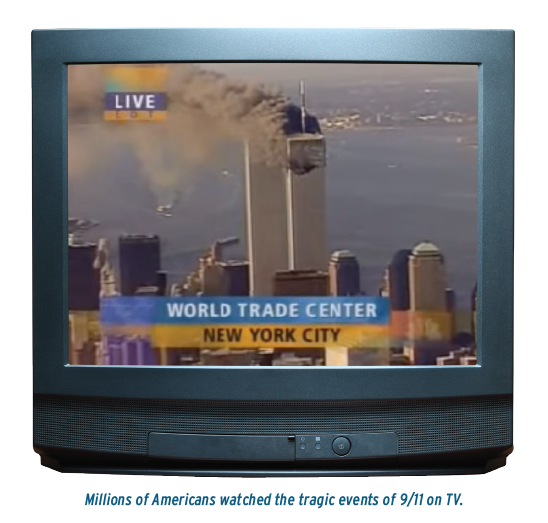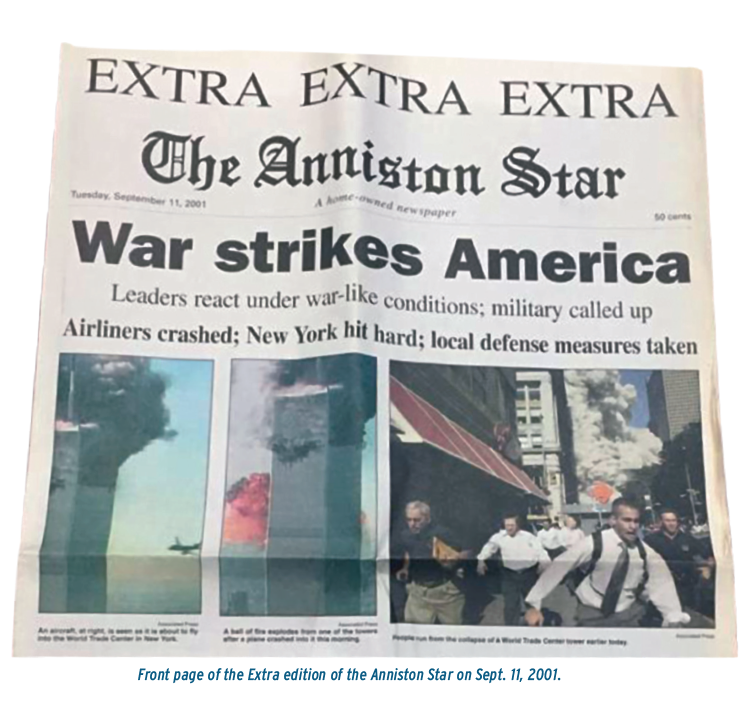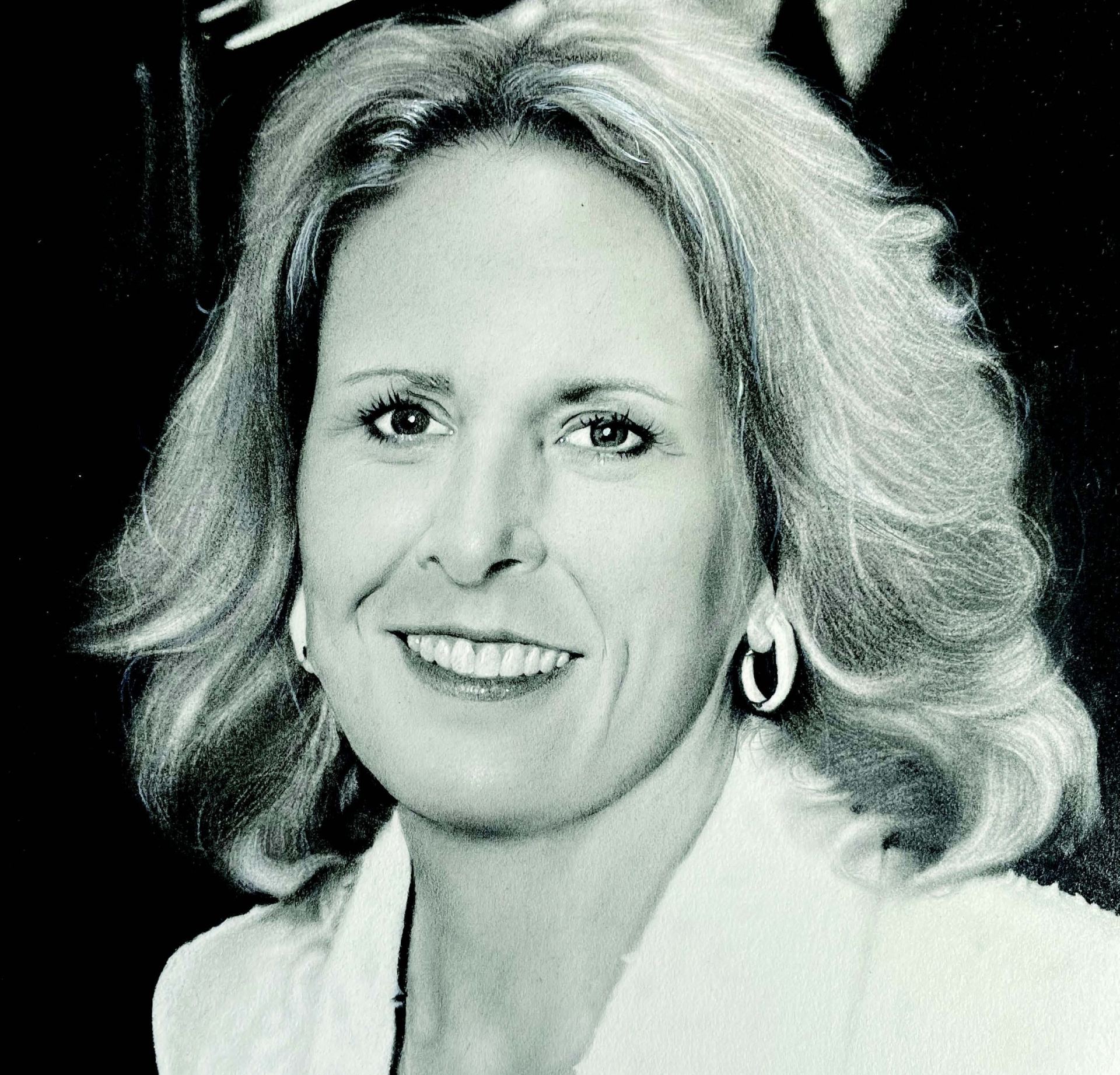The date is seared in their minds, branded not only as a bookmark of history, but as a grim milestone of news reporting.
By Troy Turner ’84
The date is seared in their minds, branded not only as a bookmark of history, but as a grim milestone of news reporting: Sept. 11, 2001. Now, 20 years later, veteran journalism graduates who learned their craft at Auburn University vividly reflect on the impact 9/11 had not just on a nation, but also in the way the story was told—both then and now.
Even journalists from the Auburn Family who weren’t working in media that day still recall the important role reporters had in putting facts on the table or editors opining in a responsible manner during the sudden call to patriotism.”

The following are some of the memories shared by Auburn journalism alumni who were working that dreadful day 20 years ago.
THEN: Editor-in-chief, SNL Financial
NOW: Dean, School of Communications,
Quinnipiac University
Most journalists working the events of 9/11 immediately began thinking of their readers and how to provide them informative content. Opelika native and Auburn graduate Chris Roush faced a different kind of cruel reality.
Roush was working as editor-inchief of a business publication that dealt directly with the inner workings of the New York financial district that was so devastated by the attacks.
“I was editor-in-chief of SNL Financial on Sept. 11. Our main “I was in Philadelphia for an NCAA committee meeting,” said former Auburn athletic director, sports information director and alumnus David Housel ’69. “I had to drive back. Riding through Washington on a wartime footing was weird, scary, but seeing my fellow Americans and children lining the freeway overpasses waving American flags in other parts of the country was moving, inspiring. I will never forget it, for many reasons.” newsroom was in Charlottesville, Va. SNL produced newsletters and magazines for Wall Street investors, analysts and money managers. I actually had a reporter in New York that morning who was there to cover a conference near the World Trade Center.
“I had just gotten into the office in downtown Charlottesville when a staffer told me about the first airplane hit. We turned on the TV to watch. I immediately thought about my staffer, whom I could not reach for several hours to find out [if ] he was OK.”
Regarding personal connections to the loss of life in the attacks: “The hardest part was that this hit our subscriber base. We lost subscribers and sources that day. Everyone on our staff lost someone they knew. It hit us particularly hard because these were the people we wrote about.
“We decided almost immediately not to publish the next few days because of the attacks. And we sent our staff home and asked them to keep the TV off.” His advice to current and future journalists:
“We treated staffers as people with emotions. When something like this happens, your first instinct should be to take care of your people and make sure that they are OK mentally and physically. The news comes second.”
THEN: Editorial page editor, Dothan Eagle
NOW: Editorial page editor, Dothan Eagle
“That Tuesday morning, I got out of the shower…when I heard my answering machine click on in another room. ‘I just heard from him; he’s OK,’ my sister said. ‘I need to go.’ I wondered what she meant, and whether I’d missed a previous call as well. I tried her back and got a busy signal. Then I got dressed and drove to my office at the Dothan Eagle, where I had been editorial page editor for several years.
“When I stepped into the newsroom, everyone who was there was riveted to the television over my head. I stepped in and turned around, and got my first glimpse of the Twin Towers, one of which had a gaping hole emitting smoke near the top of the building.
“The rest of the day was a blur. Somehow, our small staff was able to put together stories gauging the impact on the people of our community, and we managed to put out a paper the next day with information as current as possible and a glimpse of the immediate reaction of the community.
“My advice to Auburn student journalists—or anyone else in this business—would be to know your audience, and make an effort to make your reporting on events from the momentous to the mundane relevant to the people who will pick up the newspaper from their driveway, or a stand-alone rack, or click on a link to your website.”
THEN: Features editor, The Birmingham News
NOW: Executive editor, Business
Alabama Magazine
Alabama’s largest newspaper at the time was just like the state’s smallest newspapers when it came to the 9/11 story: it was all hands on deck. That included the Features section staff at the News and its editor, Alec Harvey. “Like most days, I (and Betsy Butgereit Price, who worked with me in Features) was among the first people in the office that day. We had the ‘Today’ show on and, of course, realized something was up and just became glued to the TV.
“It was horrific, and personally I feel grateful that I was with Betsy, who was (and is) a great friend… We were in touch in person or by phone constantly those next few days. She certainly helped me personally cope with the tragedy.
“In the Features Department, we did some 9/11 stories, but most of our work early on was pitching in [on the] news side, making phone calls, trying to confirm information, etc.
“The most difficult part emotionally was we knew fairly quickly that one of our colleagues, Roy Williams, had not made contact with his brother who worked at the Pentagon. Hours went on, and it became clear (and later confirmed) that he was one of the victims there. “What I recall most is [similar to] what I recall from the times we dealt with tornadoes or even elections. It was one of those moments where the newsroom came together, and everyone was helping everyone else. I honestly don’t remember any of the specific coverage, but I do remember us all trying to help each other through a horrendous time and a difficult time to report.”
Regarding the influence his earlier Auburn education had on him: “Auburn prepared me to be a team player, and that certainly came into play with The News’ coverage of 9/11. Features folks were helping news folks and sports folks and layout folks. The mood was very somber, but also electric in a way that big news stories can be in a newsroom.”

THEN: Managing editor, The Anniston Star
NOW: Founder, aladefense.com
“After the second jet slammed into the World Trade Center, it was clear that life in America would be different from that day forward. We rallied all the staff we could muster, brainstormed stories and assignments, and then we hit the streets. It wasn’t long, however, before people on the streets came to us.
“Like most daily newspapers in 2001, we were a morning paper, and the advent of internet news reporting was still a fairly novel thing for readers. Thus, we quickly made the decision to produce that day an afternoon ‘Extra’ edition that would be hawked on the streets. We called radio stations to announce it, and within an hour of that, people started lining up in our lobby waiting to get the first copies. It was not just to ‘confirm what they saw’ of the shocking story unfolding live on television, but they also knew it to be living history. This was, for example, the first Extra edition printed by The Anniston Star since the assassination of President John F. Kennedy.
“The behind-the-scenes story for me, however, came when one of the senior officers in command of the Army chemical weapons depot in Anniston visited our office and asked to speak with me in private.
“Although a post-Cold War international treaty with Russia had begun the long road to mutual destruction of chemical weapon stockpiles such as that in Anniston at the time, such work was only beginning, and the weapons stored in Anniston were of the most cruel and deadly kind. The escape of a single, detonated weapon was capable of killing tens of thousands, and for some reason, it all had been stored right there near the populated metro area of Anniston, between Birmingham and Atlanta.
“The officer knew we would be doing stories and editorials challenging the safety of the depot and its horrific weapons. So, he came to try and convince us to convince the public that every type of security imaginable was in place, including the dispatch of special forces. But, off the record at the time, he confided in the need for Army newspaper cooperation on one bit of protection seemingly beyond his control at that moment and certainly capable of causing panic if sensationalized for its weakness.
“‘We’re prepared for almost every scenario, from attack on the ground, from being hit by tornadoes or earthquakes or most anything else,’ he said. The one threat he felt might remain vulnerable and one not previously considered?
“The intentional crash of an airliner into a weapons bunker. “It was a great relief to me years later when I learned the last of the chemical weapons were destroyed and the threat no longer exists in Alabama. But that day, that week, that year, it couldn’t have been a more worrisome realization. “It was a career moment none of us will forget, and a moment in American history none of us should ever forget.”


Gone Too Soon
Mary Lynn Edwards Angell ’71 and her husband, David, were passengers on American Airlines Flight 11 when it crashed into the north tower of the World Trade Center at 8:46 am EST.
The couple had just celebrated their 30th wedding anniversary on August 14, 2001 and were making plans to move to Chatham, Mass. They were flying back to Hollywood to attend the 53rd Annual Primetime Emmy Awards, for which one of David’s shows, “Frasier,” had been nominated in the Outstanding Comedy Series category.
Lynn graduated with a degree in elementary education and pursued a career as a librarian. After marrying, the Angells lived in Providence, R.I. before moving to Hollywood for David to try to break into television writing, which he did with a script for the “Archie Bunker’s Place” sitcom. Later, his “Old Flame” episode of “Cheers” won an Emmy for “Best Comedy Writing in a Series.” He also was one of three creators of the sitcoms “Wings” and “Frasier,” which he also produced.
After David’s success was secure, Lynn “retired” from her job as a librarian and took on a volunteer position with the Hillsides Home for Children, a refuge for abused and emotionally troubled children in Pasadena, Calif. She made numerous anonymous financial contributions to the school and took a personal interest in the lives of the 60-plus students, knowing each one by name and sending postcards to each of them when she was vacationing. She also personally—and quietly—paid for golf lessons and other activities for the children.
Just prior to 9/11, the couple launched the Angell Foundation to support projects in spirituality, arts, youth, education and social justice.
By Kate Asbury Larkin ’21
THEN: Features editor, Florida Today
NOW: Food editor and lifestyles columnist, Florida Today
“I had a dentist appointment the morning of Sept. 11, 2001, so I was in a bit of a rush. My car radio was tuned to WMFE, the Orlando NPR station, and as I zoomed across the Pineda Causeway from Satellite Beach to Melbourne, I heard a snippet of a report about a plane hitting one of the Twin Towers.
“I imagined a scene from the original ‘King Kong’ movie: A tiny plane buzzing around a big building ending in a minor freak accident.
“It wasn’t until I got back in my car an hour later that I realized the magnitude of what was happening. Planes had crashed into the Pentagon and a field in Pennsylvania. This was no freak accident. I called the dentist’s office and probably terrified the receptionist. ‘Y’all need to turn on a radio. Y’all need to follow what’s happening. This is serious. This is bad.’ I hung up and drove to the newsroom.
“It was eerie. Phones were ringing, but otherwise, it was oddly quiet. A group of reporters and editors had gathered around the TV screens in the center of the room. Then everyone snapped into action.
“In addition to finding local angles for what was happening in New York, Washington and Pennsylvania, we realized we, too, could be targeted. Kennedy Space Center is here. Patrick Air Force Base is here. Port Canaveral is here. And Disney World isn’t far away.
“As a features editor, I didn’t write about 9/11. I helped edit stories coming in from the rest of the newsroom.
“It was a long day. That goes without saying. We all had friends in New York and Washington. We all were terrified about what this meant to our country and our community. But I’m proud of the way everyone put aside their personal feelings and did what we do best. We kept our community informed. “I’ve worked on many horrific stories in the past 35 years. I’ve written about murder investigations and accidental drownings. I helped with coverage of the crash of Space Shuttle Columbia and the Pulse nightclub shootings. Sometimes digging into someone’s grief can seem too personal and invasive. But my Auburn training helped me realize my job lets me give others a voice.
“Through journalism, victims become people. They are parents, siblings, friends. Their survivors take comfort in talking, knowing that others will see their loved one as who they were, not just how they died.”

A Foundation to Lead: the Auburn Law Society
A student club started more than 60 years ago has had a far-reaching impact on the state of Alabama.
The Life of George McMillan ’66
From student government president to lieutenant governor and music festival empresario, George McMillan’s life of public service had an outsized impact on the state of Alabama.
An Eye for Action
From the mound to the mountain, Blake Gordon ’03 has captured life on the edge.
A Foundation to Lead: the Auburn Law Society
A student club started more than 60 years ago has had a far-reaching impact on the state of Alabama.
The Life of George McMillan ’66
From student government president to lieutenant governor and music festival empresario, George McMillan’s life of public service had an outsized impact on the state of Alabama.
An Eye for Action
From the mound to the mountain, Blake Gordon ’03 has captured life on the edge.


